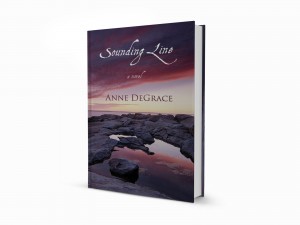Sounding Line
Books
 On the evening of October 4, 1967, the tiny fishing village of Perry’s Harbour, Nova Scotia, is invaded: by the “incident”—which sends local fishermen scrambling to find survivors of an assumed plane crash—and by everything that comes after.
On the evening of October 4, 1967, the tiny fishing village of Perry’s Harbour, Nova Scotia, is invaded: by the “incident”—which sends local fishermen scrambling to find survivors of an assumed plane crash—and by everything that comes after.
Young Pocket Snow has a lot to contend with even before the unidentified flying object crashes into the harbour, bringing in its wake military and media interest. That’s because, just as the UFO incident creates a vortex, another is happening within the Snow household as Pocket’s mother approaches death, and his father tries to cope.
At Crosbey’s General Store, Shirley presides as information clearing-house and coffee-pourer, and it is here that locals gather to discuss how the Coast Guard, RCMP, Canadian Navy and U.S. military—a knot of vessels squatting mysteriously out on the Sound—aren’t talking to the people of Perry’s.
While en route to cover the crash, Ottawa reporter Rodney Nowland meets Wanda, a psychic UFO-chaser hoping to communicate with visitors from space. The CBC sends a film crew; a reporter from the Halifax paper is expected at any moment.
Meanwhile the Snow family holds its breath, and yet, with the arrival of strangers, the spark of possibility touches down, alighting briefly upon them all—even Merle Snow. In fact, the incident touches everybody, the people of Perry’s transformed in subtle ways.
Sounding Line is based on a true incident that occurred in 1967 in Shag Harbour, Nova Scotia. The incident attracted national and international news media, and has been the subject of books and documentaries. It is considered Canada’s most significant UFO incident, and is sometimes referred to as “Canada’s Roswell.”
Excerpt
Nobody seemed to have noticed or cared that Pocket hadn’t gone to school. Both his father and Scratch had simply nodded when he came back downstairs without his schoolbooks. After breakfast, Wilf wandered off to Crosbey’s to look for a teapot. When he came back, “they’re all talking about aliens,” he said, and shook his head before holding up both hands, empty. “No teapots,” he said, then: “Call me if you need me. I’m goin out to the shed.”
Review
The way in which DeGrace tells this tale is nothing short of exquisite.
Book Club Questions
- Residents of small, rural communities tend to have a shared history, including intimate knowledge about one another’s past histories—for better or worse. What examples are there in Sounding Line? In your own experience? Do you think this is as prevalent today as it was, say, 50 years ago?
- Nuances of expression, figures of speech, and sometimes nicknames are elements of rural life. What phrases are particular to Sounding Line? What figures of speech do you remember from communities in which you’ve lived? Is this phenomenon similar to teen-speak, or the shared language of another cohort?
- Some characters in Sounding Line believe in things others may find absurd: alien landings, fortune-tellers, harbingers. One man’s superstition may be another’s truth. To what degree do you think superstitions shapes our lives? Can you think of things that you believe to be true, but that you know others do not?
- The author leaves the door open for possibility when it comes to the extraterrestrial and the supernatural, including the existence of heaven, or a life after death. Why do you think she did this? Was this satisfying or dissatisfying for you as a reader?
- In the space of a few days, several characters in Sounding Line learn something about themselves that will help inform their futures, or the way they see the world. What conclusions did Rodney, Pocket, Cuff, Ernie, and Shirley come to in the course of events?
- Pocket and Cuff—two parts to a coat—are as different as they can be. Or are they? What illustrates their differences? Their similarities? What brings them to an uneasy reconciliation?
- What are some examples of humour in Sounding Line? What parts made you smile? Did any parts choke you up? Why?
- The author plays with the concepts of space and depth—what lies beyond what we know. How do these concepts apply to Merle, and her impending death? What examples suggest that Merle is playing with these thoughts, too?
- Between each day as it unfolds is an “interlude” chapter: a short piece written in second person. Who or what do you think is the entity behind the voice? What was the author’s intention in including these?
- Sounding Line is based on a true incident that occurred in Shag Harbour, Nova Scotia, in 1967. What can you find out about this incident online or in books? What do you think came down into the harbour that night?
